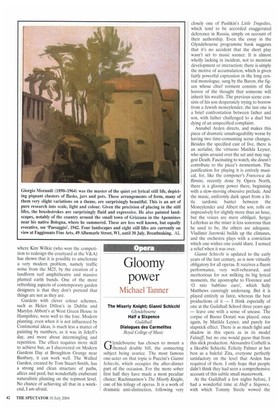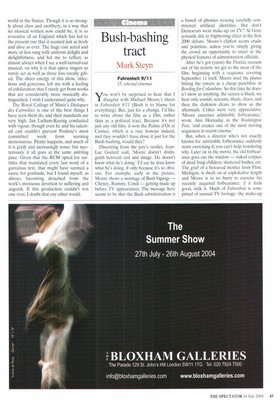Gloomy power
Michael Tanner
The Miserly Knight; Gianni Schicchi Glyndeboume Half a Sixpence Guildhall Dialogues des Carmelites Royal College of Music
Glyndebourne has chosen to mount a themed double bill, the connecting subject being avarice. The most famous one-acter on that topic is Puccini's Gianni Schicchi, which occupies the after-dinner part of the occasion. For the more sober first half they have made a most peculiar choice: Rachmaninov's The Miserly Knight, one of his trilogy of operas. It is a work of dramatic anti-distinction, following very
closely one of Pushkin's Little Tragedies, which tend to be accorded exaggerated deference in Russia, simply on account of their authorship. Even the essay in the Glyndebourne programme book suggests that it's no accident that the short play wasn't set to music sooner. It is almost wholly lacking in incident, not to mention development or interaction; there is simply the motive of accumulation, which is given fairly powerful expression in the long central monologue, sung by the Baron, the figure whose chief torment consists of the horror of the thought that someone will inherit his wealth. The previous scene consists of his son desperately trying to borrow from a Jewish moneylender, the last one is a brief confrontation between father and son, with father challenged to a duel but dying of an unspecified complaint.
Annabel Arden directs, and makes this piece of dramatic unsalvageability worse by having two time-consuming scene changes. Besides the specified cast of five, there is an aerialist, the virtuoso Matilda Leyser, who spins around over the set and may suggest Death. Fascinating to watch, she doesn't contribute to the piece's momentum. The justification for playing it is entirely musical, for, like the composer's Francesca da Rimini, recently done by Opera North, there is a gloomy power there, beginning with a slow-moving obsessive prelude. And the music, uniformly dark apart from a little sardonic banter between the Moneylender and Albert the son, rolls on impressively for slightly more than an hour, but the voices are mere obbligati. Sergei Leiferkus as the miser is less sonorous than he used to be, the others are adequate. Vladimir Jurowski builds up the climaxes, and the orchestra plays with a conviction which one wishes one could share. I sensed a relief when it was over.
Gianni Schicchi is updated to the early years of the last century, as is now virtually obligatory for all operas. It receives a fluent performance, very well-rehearsed, and meritorious for not milking its big lyrical moments, the apostrophe to Florence and '0 mio babbino caro', which Sally Matthews cunningly undersang. But it is played entirely as farce, whereas the best productions of it — I think especially of one at the Guildhall School three years ago — leave one with a sense of unease. The corpse of Buoso Donati was played, once again, by Matilda L,eyser, and purely for slapstick effect. There is as much light and shadow in this opera as in its model Falstaff, but no one would guess that from this slick production. Alessandro Corbelli is a likeable Schicchi, Felicity Palmer at her best as a baleful Zita, everyone perfectly satisfactory on the level that Arden has required of them. I only hope that people didn't think they had seen a comprehensive account of this subtle small masterwork.
At the Guildhall a few nights before, I had a wonderful time at Half a Sixpence, with which Tommy Steele wowed the world in the Sixties. Though it is so strongly about class and snobbery, in a way that no musical written now could be, it is so evocative of an England which has led to the present one that it seemed just as lively and alive as ever. The huge cast acted and more or less sang with uniform delight and delightfulness, and led me to reflect, as almost always when I see a well-turned-out musical, on why it is that opera singers so rarely act as well as those less vocally gifted. The sheer energy of this show, infectious and generous, left me with a feeling of exhilaration that I rarely get from works that are considerably more musically distinguished. I wish I understood quite why.
The Royal College of Music's Dialogues des Carmelites is one of the best things I have seen them do, and their standards are very high. Jan Latham-Koenig conducted with vigour, though even he and his talented cast couldn't prevent Poulenc's most committed work from seeming monotonous. Plenty happens, and much of it is grisly and increasingly tense: but mysteriously it all goes at the same ambling pace. Given that the RCM opted for surtitles that translated every last word of a garrulous text, that might have seemed a cause for gratitude, but I found myself, as always, becoming detached from the work's strenuous devotion to suffering and anguish. If this production couldn't win one over, I doubt that any other would.



























































 Previous page
Previous page